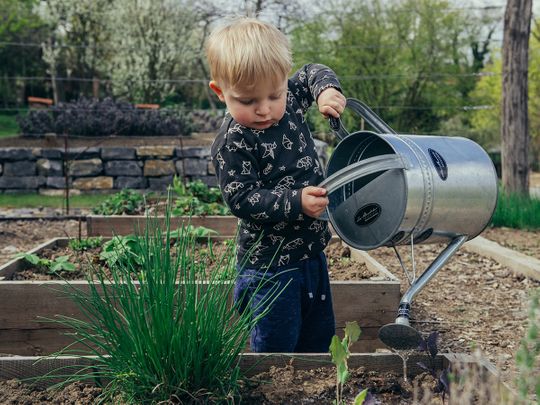
If you want your child to learn maths, understand science, get some sun, take care of their environment, and develop a sense of wonder, there’s one activity that takes care of it all: gardening.
Click start to play today’s Spell It, where you can find things that grow in your garden, like a “lily” or “fennel”.
An underrated activity, tending to a garden has been linked to higher scientific achievement, better immunity, and the promotion of team building and communication skills. But our busy lives often leave no time for Nature, let alone the inclination to build a tiny version of it in our backyards or balconies.
A UK-based research company called OnePoll surveyed 2,000 British adults and released surprising results last week, according to online research database Study Finds. The study found that one in four people could not distinguish between a moth and a butterfly. A quarter of the participants had no idea that caterpillars transform into butterflies, and three in four felt more confident identifying pigeons than any other creature in a garden.
With their limited knowledge of what’s going on in their environment, 62 percent of the adults surveyed said they wished they had spent more time learning about Nature and wildlife as children.
It’s understandable. The impact of Nature on all our senses, and our brains, has long been acknowledged to be invaluable. The wonder of seeing a garden grow helps spark children’s curiosity, and gets them asking questions: How do plants ‘drink’ water? Why do they need the sun? Do worms have homes in the soil?
Gardening also naturally involves a little maths. Children learn to measure how much their plants are growing week by week, or are able to count the flowers on each plant. They are also able to identify different plant species, label their parts, and become little botanists without realising it.
The physical act of gardening itself can promote a healthy body and help children get their hands and feet dirty. According to a March 2016 report in US-based news website PBS, getting children to dig around in the dirt runs counter to the modern parenting style of always keeping hands and surfaces sanitised and germ-free.
Many studies have come out with evidence supporting the hygiene hypothesis theory – the idea that a lack of exposure to germs actually causes children to become more susceptible to diseases like asthma, allergies and autoimmune conditions, by suppressing the development of the immune system. By getting some sunshine, digging in the dirt, moving around soil, carrying heavy watering cans, and pushing wheelbarrows, children develop better gross motor skills, strength, and immunity. They also remain calm and focused.
Finally, when the harvest is complete, imagine a child’s joy at picking his/her own fruits or vegetables – full of brain-building vitamins, minerals and phytonutrients – and his/her sense of appreciation for how Nature provides the food on our plates. It gives them a sense of responsibility toward their environment and a deep respect for the planet.
Do you encourage your child to garden? Play today’s Spell It and let us know at games@gulfnews.com.



